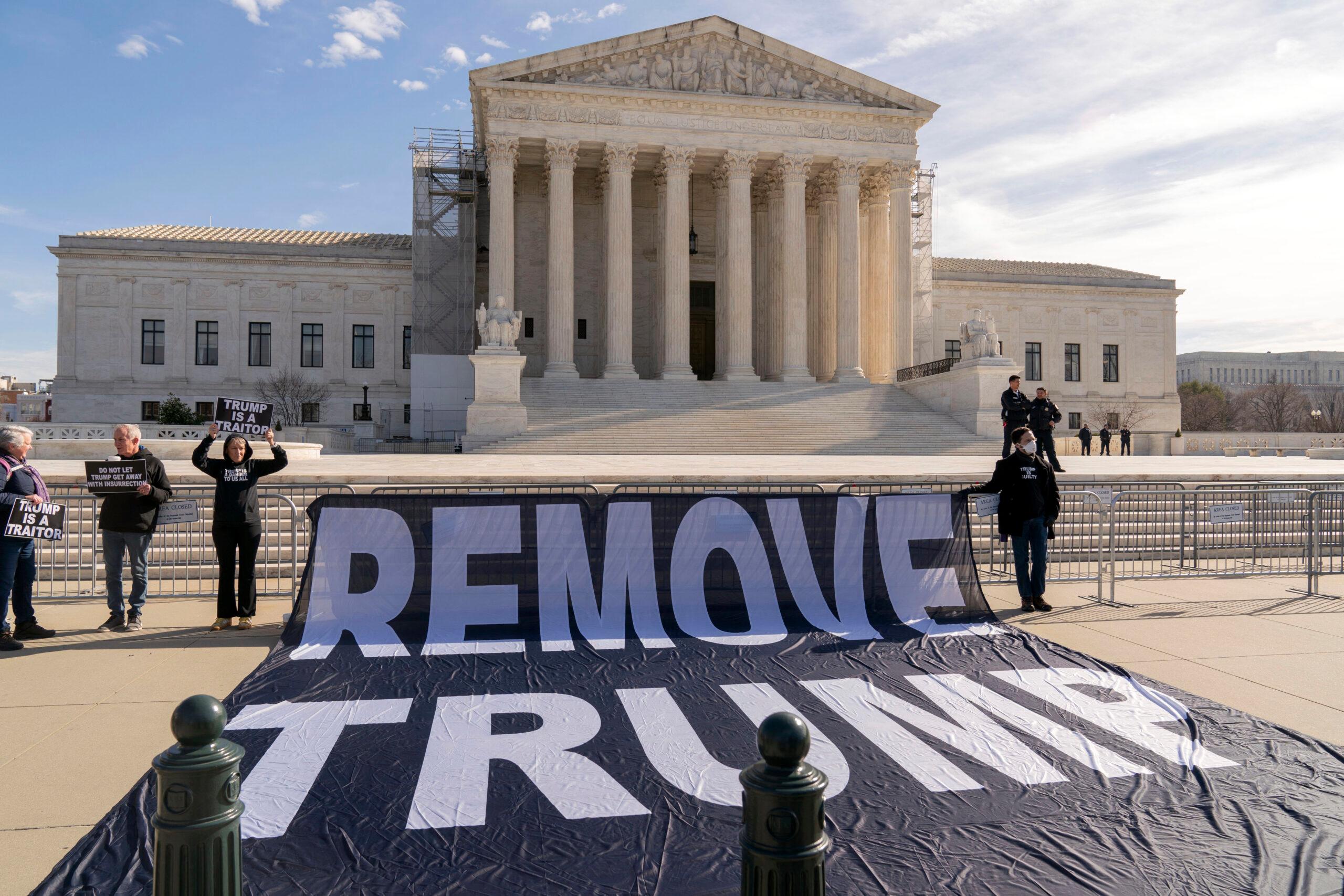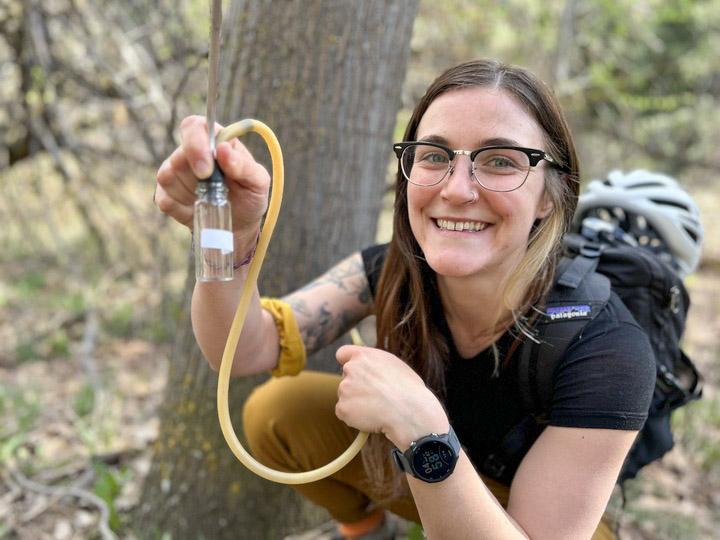
One of the plaintiffs in the Colorado case to ban former president Donald Trump from Tuesday’s Republican presidential primary said she isn’t surprised the U.S. Supreme Court overturned the Colorado Supreme Court ruling and returned him to the ballot.
But that doesn’t mean she was accepting of the decision.
“I respect the court, I respect their decisions, but I'm disappointed in the outcome,” Krista Kafer told Colorado Matters senior host Ryan Warner. “I've read the decision and it really is not a surprise given their questions (during oral arguments last month). I was at the U.S. Supreme Court when they were hearing the case, and they did seem skeptical at the time.”
“It seemed to me that they were concerned about the outcome, which is interesting given that about half the court considered themselves to be originalists and originalists are more concerned with the text usually and the meaning of the text than with the outcome," Kafer said. "And they all decided that the outcome would be disruptive. My concern is that yes, it would be disruptive, but is it not dangerous, far worse than disruptive to have somebody on the ballot who has been engaged in insurrection?”

Kafer, a Republican who works as a newspaper columnist and educator, discussed her thoughts on the process that led to the U.S. Supreme Court’s ruling. She also weighed in on what she perceived to be a “small victory” in the decision: that the justices didn’t address whether Trump participated in an insurrection during the January 6, 2021, attack at the U.S. Capitol.
“If they disagreed with it, I mean that claim is not only in the original case, but it's also in a lot of the amicus briefs,” Kafer said. “It's something they certainly could have said, ‘No, he didn't engage in insurrection,’ but they (were silent). And in this case, I'm going to take silence as acquiescence.”
Read the interview
The following transcript was edited for length and clarity.
Ryan Warner: What is your reaction to the ruling?
Krista Kafer: Well, it's as you would suspect, I am disappointed. I respect the court, I respect their decisions, but I'm disappointed in the outcome.
Warner: Have you been able to read much of the decision, Krista?
Kafer: I have. I've read the decision and it's not a surprise given their questions. I was at the U.S. Supreme Court when they were hearing the case. And they did seem skeptical at the time. It seemed to me that they were concerned about the outcome, which is interesting given that about half the court considered themselves to be originalists, and originalists are more concerned with the text usually and the meaning of the text than with the outcome.
And they all decided that the outcome would be disruptive. My concern is that yes, it would be disruptive, but is it not dangerous, far worse than disruptive to have somebody on the ballot who has been engaged in insurrection? And I think about those who crafted this decision or crafted this amendment well over 100 years ago, they had seen what insurrection does when it becomes full-scale rebellion and the danger that poses. So they crafted this section to make sure it didn't happen again. So I definitely have concerns.
Warner: This means that you get to vote against Donald Trump. Is there some satisfaction in that for you?
Kafer: I mean, not really. I will be voting against him, obviously. And I think, again, my concern is, and it's echoed in the minority’s decision, particularly the three liberal judges, when we look at the intent of that provision and the idea that yes, under normal circumstances, voters should decide. But when you have a demagogue who has incited insurrection, there should be other means of preventing that person from taking power.
And when I look at the decision that says that Congress and the voters alone should make that decision, I understand it. But on the other hand, we see how many Republican congressmen and women are completely beholden to Trump, are not the least bit bothered by January 6th and continue to enable his lies. Can we really trust Congress? Can we really trust voters when so many are swept away by the words of this demagogue?
My only hope is that as this decision broke this morning, the first couple of texts and emails that I got were from friends who are Republicans who said how sorry they were that this was decided this way and how proud they were of Norma Anderson and the other litigants on this case.
Warner: Norma Anderson, whose name is on this case, Trump v. Anderson, one of the other plaintiffs, again, a group of bipartisan voters in Colorado. What do you make of the fact that it is a unanimous decision? I mean, what does that say about the weakness of the case?
Kafer: I actually think it says something more about the court itself. They were all very concerned about whether this would be disruptive and that was reflected in their remarks. And I know that under (Justice John) Roberts, he has really worked to try to have the court act unanimously as often as possible. I would, though, point to the minority's opinion, which says, 'Yeah, we do concur that this would be disruptive, but we have concerns that they're simply saying that Congress is the only way to keep an insurrectionist off the ballot. There could be other ways; why should the court make that determination?'
And as I said before, if it's just Congress including those who are beholden to this powerful person and just the voters who may be swept away under the influence of a demagogue, surely there must be some other way to prevent an insurrectionist from being on the ballot. So I would agree with the minority in this case.
Warner: The case coming from Colorado certainly addressed the question of whether Mr. Trump engaged in insurrection. Colorado found that he did. The high court did not really address that. What do you take that to mean?
Kafer: I take that as a small victory actually, because if they disagreed with it, I mean that claim is not only in the original case, but it's also in a lot of the amicus briefs. It's something they certainly could have said, “No, he didn't engage in insurrection.” But they didn't. Their silence, and in this case, I'm going to take silence as acquiescence.
Warner: And we know in April the justices will hear the case of whether Mr. Trump has immunity in regards to legal action around January 6th. So I imagine you'll watch that with some anticipation.
Kafer: Yes. And I think their decision in this gives them cover to do the right thing in that case.
Warner: I'm going to read from the decision, and you can just listen to this. I think it's interesting to bring the decision and its words to life, that justices had some concern about the differences this could create among the states if your case was allowed to move forward. So I'm just going to read:
"Some states might allow a Section 3 challenge to succeed based on a preponderance of the evidence, while others might require a heightened showing. Certain evidence like the congressional report on January 6th on which the lower courts relied here might be admissible in some states, but inadmissible hearsay in others. Disqualification might be possible only through criminal prosecution as opposed to civil proceedings. Indeed, in some states, procedures for excluding an ineligible candidate from the ballot may not exist at all. The justice is right. The result could well be that a single candidate would be declared ineligible in some states, but not others."
Speak to the chaos they seem to want to avoid.
Kafer: I think it's completely understandable. It most certainly would've been disruptive if they had ruled in our favor. But we also have to contrast that with the danger of saying that it's okay to allow somebody who's incited insurrection to run again. It's given Trump a green flag. It's given any future person like Trump, any demagogue with power who has lost an election incited insurrection. It's given a green flag to that person that they may run again, and we will see that happen. Well, we'll see it happen this year.








